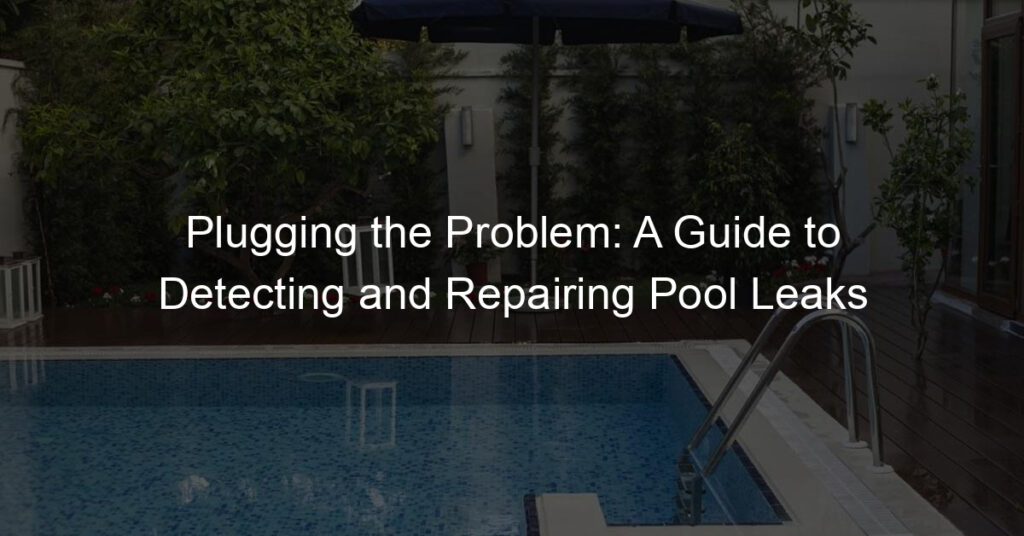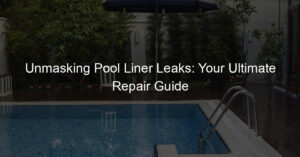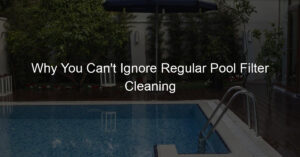Introduction to Pool Leak Detection
Swimming pools are a great source of fun and relaxation, but they also require regular maintenance. One of the most common issues pool owners face is a leak. Detecting and addressing pool leaks promptly can save you time, money, and ensure your pool remains a safe and enjoyable place.
-
- Understanding the Importance of Detecting Pool Leaks
Pool leaks can lead to significant water loss, which not only increases your water bill but also can cause damage to the pool structure and surrounding areas. If left unaddressed, a small leak can turn into a costly repair. Detecting a leak early can prevent these issues and help maintain the longevity of your pool.
-
- Common Signs of a Swimming Pool Leak
There are several signs that your pool may have a leak. These include:
-
-
- Unexplained water loss: If you notice that your pool’s water level is dropping faster than usual, it could be a sign of a leak.
- Increased chemical demand: A leak can cause your pool’s chemicals to become unbalanced, requiring more frequent additions.
- Cracks in the pool deck: Leaks can cause the ground around your pool to shift, leading to cracks in the pool deck.
- Wet spots around the pool: If you notice wet spots around your pool that never seem to dry, it could be a sign of a leak.
-
By being aware of these common signs, you can detect a pool leak early and take the necessary steps to address it.
Methods for Detecting Pool Leaks
Identifying a pool leak can be challenging, but with the right methods, you can easily detect and address the issue. Here are some do-it-yourself (DIY) techniques that you can use to detect pool leaks.
DIY Pool Leak Detection
Before calling in a professional, there are a few simple methods you can try yourself. These techniques are cost-effective and can be done with items you likely already have at home.
-
- Visual Inspection
Start by visually inspecting your pool. Look for areas where water may be escaping. This could be cracks in the pool’s surface, loose tiles, or damp spots around the pool. Remember, even a small crack can lead to a significant leak over time.
-
- The Bucket Test
The bucket test is a straightforward method to determine if your pool is leaking. Fill a bucket with pool water and mark the water level. Place the bucket in the pool, then mark the water level on the outside of the bucket. After 24 hours, compare the two levels. If the pool water level has dropped more than the water inside the bucket, you may have a leak.
-
- Dye Test
If you suspect a specific area is leaking, the dye test can help confirm your suspicion. Using a small amount of dye, release it near the suspected leak. If there’s a leak, the dye will be drawn towards it, providing a clear indication of where the problem lies.
These DIY methods can help you detect a pool leak. However, if you’re unable to find the leak or if the problem persists, it may be time to call in a professional. Remember, the earlier a leak is detected and repaired, the less damage it can cause to your pool and surrounding area.
Professional Pool Leak Detection Methods
When it comes to detecting leaks in your swimming pool, professionals have a few tricks up their sleeves. These methods are highly effective and ensure accurate results. Let’s delve into these professional pool leak detection methods.
-
- Pressure Testing
Pressure testing is a common method used by professionals to detect leaks in pools. In this process, the plumbing lines of the pool are filled with water or air under pressure. If there’s a leak, the pressure will drop, indicating the presence of a leak. This method is highly effective for detecting leaks in the plumbing system of the pool.
-
- Electronic Leak Detection
Electronic leak detection is another advanced method used by professionals. This method involves the use of specialized equipment that can detect the sound of water escaping from a leak. The equipment is highly sensitive and can detect even the smallest leaks with high accuracy. This method is particularly useful for detecting leaks in the pool’s structure or shell.
-
- Geophone Water Leak Detection
Geophone water leak detection is a sophisticated method that uses ground microphones to detect the sound of water movement. These microphones are placed around the pool and can pick up the sound of water escaping from a leak. This method is highly accurate and can pinpoint the exact location of the leak, making it easier for professionals to repair.
In conclusion, professional pool leak detection methods are highly effective and accurate. They use advanced equipment and techniques to ensure that no leak goes undetected. So, if you suspect a leak in your pool, it’s always best to call in the professionals.
Swimming Pool Repair: Addressing the Leak
When it comes to swimming pool maintenance, addressing leaks promptly is crucial. Not only can leaks lead to water loss, but they can also cause significant damage to the pool structure and surrounding areas. Here, we will explore how to identify and repair pool leaks yourself.
DIY Leak Repair
While some leaks may require professional attention, many can be fixed with a bit of DIY know-how. The process involves identifying the type of repair needed, gathering the necessary materials and tools, and following a step-by-step guide to repairing the leak.
-
- Identifying the Type of Repair Needed
First, you need to determine the type of repair needed. This will depend on where the leak is located. Common areas include the pool liner, the plumbing system, or around the pool equipment like the pump or filter. Once you’ve identified the source of the leak, you can determine the best repair method.
-
- Materials and Tools Required
Depending on the type of repair, you may need different materials and tools. For example, if the leak is in the liner, you might need a patch kit. If it’s in the plumbing, you might need plumber’s putty or epoxy. Common tools for pool leak repair include a pool skimmer, a garden hose, and a pair of pliers.
-
- Step-by-Step Guide to Repairing Pool Leaks
Once you’ve identified the leak and gathered your materials, it’s time to start the repair. Here’s a general guide:
-
- Turn off the pool pump and drain the pool to below the level of the leak.
- Clean the area around the leak thoroughly.
- Apply your repair material (such as a patch or putty) according to the package instructions.
- Allow the repair to dry completely before refilling the pool.
- Monitor the repair closely for the first few days to ensure it’s holding.
Remember, if the leak is large or complicated, it may be best to call in a professional. But for small, simple leaks, these steps can help you get your pool back in shape quickly and affordably.
Professional Pool Leak Repair Services
While some pool leaks can be managed with a do-it-yourself approach, there are times when it’s best to call in the professionals. Let’s explore when to call a professional and what you can expect from these services.
-
- When to Call a Professional
There are several signs that it’s time to call a professional pool leak repair service. If you’ve tried to repair the leak yourself and it’s still persisting, it’s time to call in the experts. Other signs include significant water loss, cracks in the pool structure, or if the leak is located in a hard-to-reach area. Professionals have the tools and expertise to handle these complex situations.
-
- What to Expect from Professional Repair Services
When you hire a professional pool leak repair service, you can expect a thorough inspection of your pool. They will use advanced detection methods to locate the source of the leak. Once the leak is identified, they will provide a detailed repair plan. This plan will include the necessary repairs, estimated costs, and a timeline for completion. Professional services also often offer warranties on their work, providing you with peace of mind.
In conclusion, while DIY methods can be effective for minor leaks, professional pool leak repair services are essential for more complex issues. They offer expert solutions, saving you time and potentially costly future damages.
Preventive Measures and Regular Pool Maintenance
Preventing pool leaks is just as important as detecting and repairing them. Regular pool maintenance and preventive measures can save you from costly repairs and ensure a safe and enjoyable swimming experience. Let’s delve into the key aspects of pool maintenance.
-
Regular Pool Inspections
Regular pool inspections are a crucial part of pool maintenance. They help identify potential problems before they escalate into major issues. A thorough inspection should include checking the pool’s surface for cracks, inspecting the pool equipment for any signs of wear and tear, and ensuring the pool’s water level is consistent. According to a study, regular inspections can prevent up to 60% of potential pool leaks.
-
Maintaining Water Chemistry
Water chemistry is vital to the health of your pool. Imbalanced pool water can lead to corrosion, algae growth, and even leaks. It’s recommended to check your pool’s pH, chlorine, and alkalinity levels at least once a week. A well-maintained pool should have a pH level between 7.2 and 7.8, and a chlorine level between 1.0 and 3.0 parts per million.
-
Proper Pool Equipment Maintenance
Proper maintenance of pool equipment is another essential preventive measure. This includes cleaning the pool filter regularly, ensuring the pool pump is functioning correctly, and inspecting the pool heater for any signs of damage. Regular maintenance of pool equipment not only prevents leaks but also extends the lifespan of the equipment, saving you money in the long run.
In conclusion, preventive measures and regular pool maintenance are key to preventing pool leaks and ensuring a safe and enjoyable swimming experience. Remember, prevention is always better than cure!
Case Study: Successful Swimming Pool Leak Solutions
Let’s dive into two real-life examples that illustrate how swimming pool leaks can be successfully detected and managed. These case studies highlight the importance of professional intervention and the effectiveness of the methods discussed in the previous sections.
-
Case Study 1: Residential Pool Leak Detection and Repair
In a suburban neighborhood, a homeowner noticed a significant drop in their pool’s water level. They contacted a professional pool leak detection service, which used a combination of pressure testing and dye testing to locate the leak. The leak was found in the pool’s plumbing system, a common place for leaks to occur.
Once the leak was detected, the repair process began. The professionals used a special epoxy to seal the leak, ensuring that it was completely waterproof. After the repair, the pool’s water level remained stable, indicating a successful repair. This case study underscores the importance of professional leak detection and repair services in maintaining the integrity of residential swimming pools.
-
Case Study 2: Commercial Pool Leak Management
In a commercial setting, a hotel’s large swimming pool was losing water at an alarming rate, leading to increased water bills and potential structural damage. The management called in a professional pool leak detection service. Using advanced electronic leak detection, the team found multiple small leaks in the pool’s liner.
The repair process involved patching the liner at the leak sites. The team also recommended a regular maintenance schedule to the hotel management to prevent future leaks. Post-repair, the pool’s water level stabilized, and the hotel saw a significant decrease in their water bills. This case study demonstrates the critical role of professional leak management in commercial settings, where the stakes are often higher due to the larger size and usage of the pools.
These case studies highlight the importance of professional intervention in detecting and repairing pool leaks. Whether in a residential or commercial setting, a professional approach ensures effective solutions and long-term pool health.
Conclusion: Ensuring a Leak-Free Swimming Experience
In this article, we’ve explored the world of swimming pool maintenance, with a focus on detecting and repairing leaks. Let’s recap what we’ve learned and understand why regular pool maintenance is so important.
- Recap of pool leak detection and repair methods
First, we learned about different methods to detect pool leaks. These methods include the bucket test, dye test, and professional leak detection services. We also discussed how to repair these leaks once they’re found. Depending on the severity of the leak, repairs can range from simple patch jobs to more complex plumbing work.
- The importance of regular pool maintenance
Regular pool maintenance is crucial to ensure a leak-free swimming experience. By keeping an eye on your pool’s water level and performing regular checks, you can catch leaks early before they become a bigger problem. Regular maintenance also helps keep your pool clean, safe, and enjoyable for everyone.
Remember, a well-maintained pool is a happy pool. By staying vigilant and proactive, you can ensure a leak-free swimming experience for years to come.
So, keep your pool’s health in check, and enjoy the splash!














